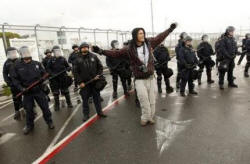|
 Exclusive:
Campaign contributions under scrutiny in California police probe Exclusive:
Campaign contributions under scrutiny in California police probe
 Send a link to a friend
Send a link to a friend
[December 11, 2014]
By Dan Levine and Kristina Cooke
OAKLAND, Calif. (Reuters) - An
investigator appointed by a U.S. federal judge is examining whether
campaign contributions affected how the city of Oakland, California,
chose its lawyers for police disciplinary cases, according to a source
briefed on the probe.
|
|
 The investigation started after an arbitrator reinstated an
Oakland police officer who was heavily criticized for firing tear
gas at a crowd of protesters during Occupy protests in 2011. That
followed a series of other cases in which arbitrators overruled
disciplinary actions for Oakland police. The investigation started after an arbitrator reinstated an
Oakland police officer who was heavily criticized for firing tear
gas at a crowd of protesters during Occupy protests in 2011. That
followed a series of other cases in which arbitrators overruled
disciplinary actions for Oakland police.
Disciplining problem officers is viewed by police reform advocates
as a crucial tool for maintaining community trust – something that
is taking on heightened importance as national protests smolder over
aggressive police tactics in Ferguson, Missouri, and New York City.
For the tear gas arbitration, Oakland City Attorney Barbara Parker
hired Stephen Roberts, a partner at large California-based law firm
Nossaman. In 2011, Roberts and two other Nossaman attorneys donated
$700 each to Parker's campaign, the maximum allowed by law,
according to campaign finance records. Four other Nossaman attorneys
donated a total of $950 to Parker's campaign.
 It is not clear on which contributions the investigation is
focusing, nor when the probe will conclude. The investigator, San
Francisco attorney Edward Swanson, declined to comment.
Parker said it is "categorically untrue" that contributions play any
role in how the city hires lawyers. Attorneys who never donated
money have been retained by the city, she said, while other
contributors have not gotten city business.
"There's obviously no quid pro quo here," she said. Roberts did not
respond to requests for comment.
In Oakland, officers can appeal any discipline meted out by the city
to an independent arbitrator. Police reform advocates generally view
arbitration as a stumbling block for cities trying to hold cops
accountable.
"It tells the conscientious, rule-abiding officers it doesn't make
any difference, you can screw up, and you'll be able to keep
working," said Mark Iris, a lecturer at Northwestern University and
former executive director of Chicago's police-oversight board.
However, attorneys who represent officers see arbitration as a
critical tool to protect public employees from unfair discipline
that's often fueled by political pressure.
[to top of second column] |

Oakland police have been under court oversight since 2003, when the
city agreed to a raft of reforms codified in a consent decree. In
ordering the arbitration probe earlier this year, U.S. District
Judge Thelton Henderson wrote "imposition of discipline is
meaningless if it is not final."
Justin Buffington, who represented Officer Robert Roche in the tear
gas arbitration, said Roberts was tasked with a difficult case and
"did a competent job". The arbitrator concluded Roche followed an
order, Buffington said.
In the past five years, Oakland has arbitrated 22 police cases,
according to records released by the city. Of those, the discipline
in 17 was overruled or modified, and in five the discipline was
affirmed. Since Parker took over as city attorney, Nossaman has
handled three arbitrations for Oakland, including the Roche case. It
won one and lost two.
Parker said her office's record for police arbitration is on par
with national averages, adding that she would "absolutely" hire
Nossaman again for such cases.
Late last week, Parker asked the judge to keep Swanson from
examining the city's communications with outside firms, citing
attorney client privilege. A hearing on that issue has not yet been
set.
(Editing by Amy Stevens and Ken Wills)
[© 2014 Thomson Reuters. All rights
reserved.] Copyright 2014 Reuters. All rights reserved. This material may not be published,
broadcast, rewritten or redistributed.
 |